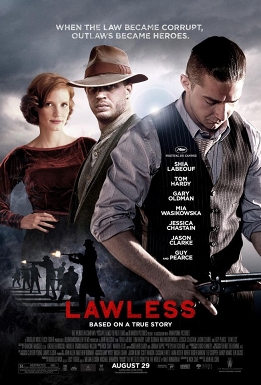On Sunday nights, HBO takes you behind the glitzy scenes of Atlantic City during Prohibition on 'Boardwalk Empire'. But a few hundred miles away, the illegal booze game was even rougher in gritty Franklin County, Virginia. That's the setting of Lawless, based on Matt Bondurant's historical novel 'The Wettest County in the World.'
Tom Hardy, in another great performance, plays Forrest Bondurant, the leader of the family band of bootleggers. This marks the second movie in a row where it's nearly impossible to understand what he's saying, as he talks in a low mumble. But it effectively displays his character, who's closed off and seems to follow the motto: Speak softly and carry a big stick.
That big stick is his brother Howard (Jason Clarke), a storm of fury who rarely does anything but get high on his own supply of moonshine. Their brother Jack (Shia LaBeouf), drives the jalopy but yearns to get deeper into the trade. LaBeouf continues to play his de facto role of naïve, scrappy upstart. While he's clearly trying to stretch himself, picking smart projects after the assault of the Transformers trilogy, his range is limited. He simply can't handle the weightier scenes.
Jack, unlike his brothers, doesn't save the fortune he's making off the illegal drink, but spends it like a fiend, buying fancy suits, souped-up cars and doing anything he can to catch the eye of the pastor's daughter (Mia Wasikowska).
The Bondurant brothers rule the county until special deputy Charlie Rakes (Guy Pearce) shows up dressed like a GQ model, demanding a cut of all their income. He doesn't want them to follow the law and stop their operation. A corrupt man like him wants the power involved with controlling it. The brothers, being stubborn badasses, refuse to "toe the line," as Pearce demands, declaring it'll get ugly if they ever come back.
Thus begins Rakes' brutal crackdown in earnest, as he shoots, beats, and tars and feathers anyone who won't adhere to his demands, or even questions his fashion choices. Pearce is relentless here and shows his versatility as an actor, considering how well he's performed in roles as varied as this, Lockout and The King's Speech.
The stakes get even higher after Jack takes a shipment on his own over the county line to notorious gangster Floyd Banner (Gary Oldman), who can pay him well enough to make his own still, where he can produce mass quantities of the stuff. Sadly, Lawless completely wastes Oldman. He's onscreen for less than five minutes.
Unfortunately, we also spend too little time with the glue that holds the boys together: Maggie Beauford (Jessica Chastain). She's a former Chicago girl who fled to the country in hopes of escaping the violence of the Windy City. She takes on the daily operations of the boys' gas station and tends to the physical and mental wounds they all receive. But because she doesn't head out guns a-blazin', she's reduced to a less important role. That's the main problem with Lawless: there are simply too many characters. That's how you get good actors (like Noah Taylor and Lew Temple) made all but invisible.
Still, there's an embarrassment of riches in this film, including the score by Nick Cave and Warren Ellis, which plays out like a darker version of the music from O Brother, Where Art Thou? The film is supremely stylish, a contrast to the gritty immediacy of Hillcoat's adaptation of The Road.
Like that bleak film, things somehow grow even more violent as the movie reaches its climax. This is surprising because we've already seen people strangled, raped and cut open. Writer Nick Cave and director John Hillcoat (who previously collaborated on the violent Australian Western The Proposition) don't shy away from the brutality inherent with the illegal booze industry.
But Cave, who so brilliantly blends the macabre and humor in his music, has trouble doing the same here. A few funny moments stick out like sore thumbs compared to everything else that's going on. And any themes the movies aims for, about brotherhood and legends, it fails to reach.
Still, as an exciting tale of bad guys vs. worse guys, Lawless stands its ground.

